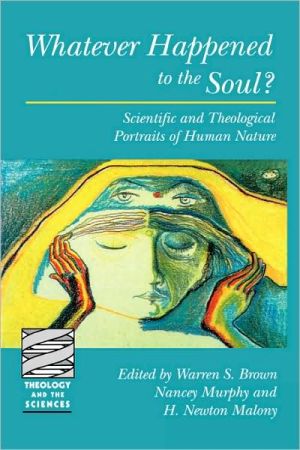

 |

|

The average rating for Whatever Happened to the Soul?: Scientific and Theological Portraits of Human Nature based on 2 reviews is 4 stars.
Review # 1 was written on 2008-01-04 00:00:00 Julie Oneill Julie OneillThis book was read in conjunction with Nancey Murphy's class The Philosophy of Spirituality class at Fuller Seminary. I admire Murphy's attempt to formulate a concept of personhood and the soul that is consonant with theology, biology, philosophy, and psychology. |
Review # 2 was written on 2019-08-03 00:00:00 Darrell Lubinsky Darrell LubinskyThis book is a collection of essays each defending the position of nonreductive physicalism. Nonreductive physicalism is a type of ontological monism which asserts that the only existing substance is physical matter. A consequence of this position is that it disallows the existence of an immaterial soul as part of the human person. Instead, the human person is to be equated with the physical body. With that said, the authors acknowledge that the concept of a soul cannot be reduced to a merely physical property, which is why they call the view "nonreductive" physicalism, although none of the authors do a good job explaining how this works. The essays can be categorized into three main types. The first type focuses on scientific developments that lead the authors to believe we ought to abandon the idea of an immaterial soul. These developments primarily involve correlating thoughts and sensations with physical reactions in the brain, but there are some discussions regarding the implications of evolutionary theory. The second type of essay argues that the proper understanding of scripture nowhere entails a belief in an immaterial and immortal soul. The third type of essay addresses philosophical challenges to nonreductive physicalism as well as raises challenges against dualistic understandings of the human person. While this book was at times an interesting read, it ultimately fell short of expectations. The essays seemed wildly out of touch with the arguments of substance dualists in favor of an immaterial soul. I've read several books and articles defending substance dualism philosophically, theologically, and biblically, yet I found discussions of none of these defenses within this book. Perhaps this is because the book is 20 years old, and maybe prior to many of the recent dualist publications, but I doubt it. The impression I was left with was that the authors must have simply avoided the bulk of dualistic arguments. Additionally, because the book is 20 years old, much of the scientific discussion is outdated and sometimes blatantly wrong. While these pieces of outdated information were largely inconsequential to the arguments at play, they nevertheless weakened the felt force of the arguments. This book was recommended to me as a good representation of a non-dualist position on the soul. For that reason it is an important read. Nevertheless, I'll continue to search for stronger arguments in more recent publications since I get the feeling this is far from the best defense there is. |
CAN'T FIND WHAT YOU'RE LOOKING FOR? CLICK HERE!!!